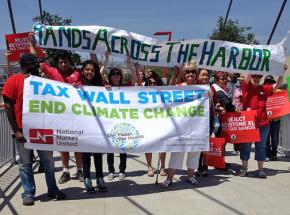Keep it in the ground
reports from Seattle on a local action against reliance on fossil fuels.
IN A national day of action under the slogan "Hands Across the Sand," people in more than 100 locations in 43 states gathered on May 17 to oppose reliance on fossil fuels. This annual event started in Florida in 2010 in response to the BP oil spill in the Gulf of Mexico. It was backed by the Sierra Club, 350.org and Climate Action Now along with other groups.
According to the Hands Across the Sand website, the purpose of the rallies is:
to ask the President and local officials to reject the use of dirty fuels in ALL processes. Ask the President to reject expanding offshore drilling, seismic blasting, hydraulic fracturing, Keystone XL pipeline, Tar Sands extraction and all other dirty fuel projects that threaten our communities and destabilize our climate.
In Seattle, more than 50 people gathered at Golden Gardens Park on Elliott Bay. Speakers from the Sierra Club, the youth wing of 350.org, Climate Action Now and Idle No More explained the issues.
The recent report that the West Antarctic Ice Sheet is collapsing and could raise sea levels 10 feet was given as an important example of the problems with global warming. Speakers noted that if sea levels rose even much less than this, the whole beach we were standing on would be under several feet of water.

Speakers stressed the urgency of the issue. Said one speaker:
This is the decade that will be the turning point. In a thousand years, people will look back at this as the most important pivotal point in world history. People will look back and say, this is the era when we went off fossil fuels. In a thousand years, our descendants will either be living in a cooler world or not at all. A 2-degree rise in temperature will make civilization difficult. A 10-degree rise end life on earth impossible.
Besides the national issues like the Keystone XL pipeline, local issues were highlighted. Activists have been fighting against a coal export terminal near Bellingham, 90 miles north of Seattle. Besides increased greenhouse gas emissions, the coal port would endanger people along the train route with coal dust, which causes increased asthma and other respiratory diseases.
Another important issue is the transport of oil through the city. Oil trains have been shown to be unsafe, especially after explosions in Canada and the U.S. In Seattle , the trains travel through downtown and an explosion could cause extensive loss of life.
At the end of the event, Sweetwater, an activist with Idle No More, led the rally in a native water ceremony to bless and cleans the water of Elliot Bay.
Though the turnout was small, people were encouraged by actions around the U.S. and the growing movement against global warming across the U.S. They vowed to continue the fight.


